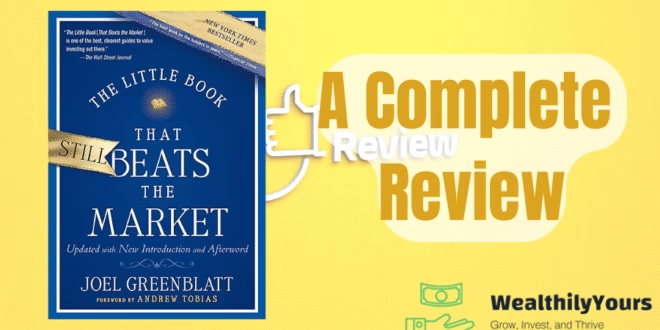When it comes to simplifying the art of investing, few books deliver the message as effectively as The Little Book That Beats the Market by Joel Greenblatt.
Originally written for his children, this investing classic strips away the jargon and complexity, offering a straightforward strategy that has stood the test of time. In this complete review, we’ll explore what makes the book so powerful, how its principles apply to UK investors, and whether it really does “beat the market.”
What is “The Little Book That Beats the Market” About?
The Little Book That Beats the Market introduces readers to a concept Greenblatt calls the “Magic Formula”, a simple investment approach that combines two key metrics:
- Earnings Yield – how cheap a stock is relative to its earnings.
- Return on Capital – how efficient a company is at turning investment into profit.
Also Read: 3 Powerful Stock Picks from “Value Migration”
Greenblatt argues that by ranking companies based on these two metrics and selecting the top performers, you can outperform market averages over the long run, no crystal ball or high-frequency trading required.
How It Applies to the UK Market
Although The Little Book That Beats the Market was written for an American audience, its principles are universally applicable, including to UK investors. For example:
- Instead of looking at the S&P 500, a British investor could apply the Magic Formula to the FTSE 350 or AIM-listed companies.
- You might use tools like SharePad, Stockopedia, or Simply Wall Street to filter UK-listed companies based on earnings yield and return on capital.
- Companies like Greggs, Rightmove, or Diageo have historically ranked well on these metrics at various times, depending on market conditions.
- This makes The Little Book That Beats the Market especially appealing for DIY UK investors who want a rules-based strategy without diving into complex analysis.
How the Magic Formula Works
Here’s how Greenblatt’s Magic Formula investing strategy plays out in practice:
- Screen a list of companies (excluding financials and utilities).
- Rank them by high return on capital and high earnings yield.
- Combine the ranks to get an overall “magic” score.
- Invest in the top 20–30 companies and rebalance yearly.
“The strategy of putting all your eggs in one basket and watching that basket is less risky than you might think.”
~ Joel Greenblatt
Also Read: 7 Powerful lessons from the Richest Man in Babylon
The book advises holding each investment for a full year to allow value to materialise. While the strategy may underperform in the short term, Greenblatt’s research shows it tends to outperform over longer periods, often by 2–4% annually over benchmarks.
UK Example: Applying the Formula in 2025
Let’s say you’re using SharePad to filter FTSE-listed companies:
- You identify that Taylor Wimpey, a UK housebuilder, has a strong return on capital and is currently trading at a discount.
- At the same time, Currys (the electronics retailer) has a high earnings yield post-COVID rebound.
- You assign rankings to both metrics and pick your top 20 performers to build a value-focused portfolio.
This exact approach mirrors the core teachings of The Little Book That Beats the Market, making it adaptable and implementable with UK tools.
Risks and Realism
One of the key points Greenblatt makes is that the formula doesn’t always beat the market every year. In fact, it can lag the broader indices for extended periods. That’s where discipline and patience come in, qualities many retail investors struggle with.
In volatile periods like Brexit uncertainty or the 2020 pandemic crash, Magic Formula stocks might seem out of favour. But over time, undervalued companies with solid fundamentals tend to recover and outperform.
Also Read: 5 Powerful lessons from the intelligent investor
That’s why The Little Book That Beats the Market isn’t just about a formula, it’s about developing the emotional discipline to trust your process.
Is It Still Relevant in 2025?
In an age of crypto hype, AI-powered investing apps, and “hot stock” culture, The Little Book That Beats the Market feels like a breath of fresh air. Its simplicity, logic, and empirical support make it more relevant than ever.
“Although over the short term, Mr. Market may set stock prices based on emotion, over the long term, it is the value of the company that becomes most important to Mr. Market.”
~ Joel Greenblatt
With platforms like Freetrade, Hargreaves Lansdown, or Trading 212, UK investors can now build their own Magic Formula portfolios with just a few clicks, even using tax-efficient wrappers like a Stocks and Shares ISA.
Final Verdict
The Little Book That Beats the Market may be small in size, but it delivers big lessons. Whether you’re new to investing or a seasoned stock picker, this book offers a structured way to build long-term wealth without the emotional rollercoaster of speculation.
It’s easy to read, surprisingly entertaining, and, most importantly, backed by data. If you’re a UK-based investor looking for a simple, proven method, The Little Book That Beats the Market deserves a spot on your bookshelf, and possibly in your portfolio strategy.
Also Read: 15 Life Changing lessons from the psychology of money
Final Thoughts
By following the core principles laid out in The Little Book That Beats the Market, British investors can adopt a time-tested, data-driven approach that doesn’t rely on market timing or financial guesswork.
And as long as you’re willing to trust the process, avoid panic selling, and think long term, you may just end up beating the market after all.
FCA Disclaimer
This article is for informational purposes only and does not constitute investment advice. WealthilyYours is not authorised or regulated by the FCA. You should always conduct your own research or seek independent financial advice when planning investments.
Enjoyed the Post? Share Your Thoughts and Spread the Word!
If you found this blog post informative and helpful, I’d love it if you could share it with your friends, family, or anyone who might benefit from it. Your support helps me reach more readers and continue creating content like this!
Also, I’d love to hear from you! What are your thoughts on the topic? Do you have any questions or insights to add? Drop a comment below - I’m here to chat and learn from your perspective too.
Thank you for being part of this journey, and I can’t wait to hear what you think!
 WealthilyYours Empowering You to Grow, Invest, and Thrive
WealthilyYours Empowering You to Grow, Invest, and Thrive




